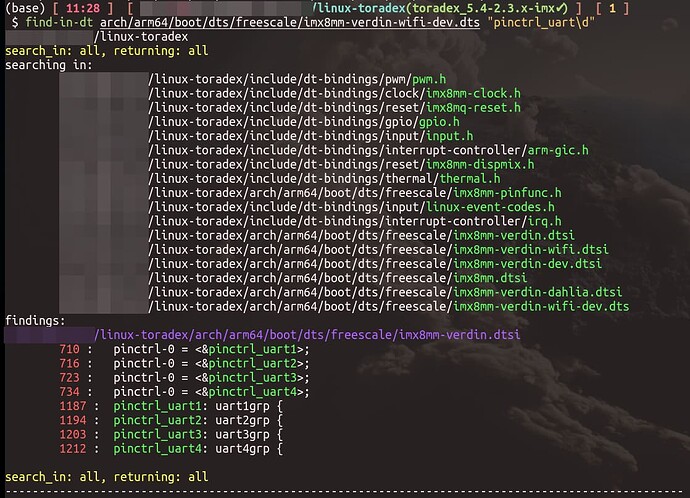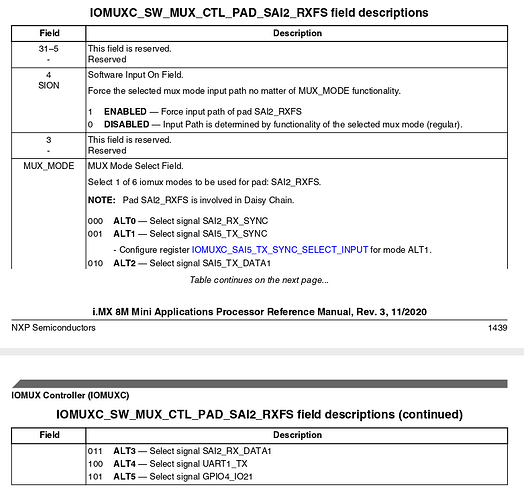Hello, we are using a custom carrier board with the Verdin imx8mm with a custom device tree.
The following pins are configured to GPIO and these are all set to output pins (to control LEDs).
However we can control these four:
SODIMM-206
SODIMM-208
SODIMM-210
SODIMM-212
But not these four:
SODIMM-137
SODIMM-139
SODIMM-141
SODIMM-143
There is the same behavior on the following pins but they are set as input pins (to control buttons):
These we can control:
SODIMM-216
SODIMM-218
SODIMM-220
SODIMM-222
These we cannot control:
SODIMM-129
SODIMM-131
SODIMM-133
SODIMM-135
If I do a gpioinfo this is the result
gpiochip4 - 32 lines:
line 0: "SODIMM_131" unused input active-high
line 1: unnamed "CTRL_SLEEP_MOCI#" output active-high [used]
line 2: "SODIMM_91" unused input active-high
line 3: "SODIMM_16" unused input active-high
line 4: "SODIMM_15" unused input active-high
line 5: "SODIMM_208" unused output active-high
line 6: "SODIMM_137" unused output active-high
line 7: "SODIMM_139" unused output active-high
line 8: "SODIMM_141" unused output active-high
line 9: "SODIMM_143" unused output active-high
line 10: "SODIMM_196" unused input active-high
line 11: "SODIMM_200" unused input active-high
It looks the same on gpiochip 0 - 3, I just showed this one to reduce text.
The pattern on the pins that do not work is that they are originally set as UART pins but it is supposed to be changed in the device tree and if I look in gpioinfo they all look the same. I used gpioset to control them.
Here’s part of the device tree for the GPIO (I did not write this device tree so I’m not 100% sure what is happening here).
gpio@30200000 {
compatible = "fsl,imx8mm-gpio\0fsl,imx35-gpio";
reg = <0x30200000 0x10000>;
interrupts = <0x00 0x40 0x04 0x00 0x41 0x04>;
clocks = <0x02 0xdf>;
gpio-controller;
#gpio-cells = <0x02>;
interrupt-controller;
#interrupt-cells = <0x02>;
gpio-ranges = <0x14 0x00 0x0a 0x1e>;
gpio-line-names = "SODIMM_216\0SODIMM_19\0\0\0\0\0\0\0SODIMM_220\0SODIMM_222\0\0SODIMM_218\0SODIMM_155\0SODIMM_157\0SODIMM_185\0SODIMM_187";
phandle = <0x2e>;
};
gpio@30210000 {
compatible = "fsl,imx8mm-gpio\0fsl,imx35-gpio";
reg = <0x30210000 0x10000>;
interrupts = <0x00 0x42 0x04 0x00 0x43 0x04>;
clocks = <0x02 0xe0>;
gpio-controller;
#gpio-cells = <0x02>;
interrupt-controller;
#interrupt-cells = <0x02>;
gpio-ranges = <0x14 0x00 0x28 0x15>;
gpio-line-names = "\0\0\0\0\0\0\0\0\0\0\0\0SODIMM_84\0SODIMM_78\0SODIMM_74\0SODIMM_80\0SODIMM_82\0SODIMM_70\0SODIMM_72";
phandle = <0x4a>;
};
gpio@30220000 {
compatible = "fsl,imx8mm-gpio\0fsl,imx35-gpio";
reg = <0x30220000 0x10000>;
interrupts = <0x00 0x44 0x04 0x00 0x45 0x04>;
clocks = <0x02 0xe1>;
gpio-controller;
#gpio-cells = <0x02>;
interrupt-controller;
#interrupt-cells = <0x02>;
gpio-ranges = <0x14 0x00 0x3d 0x1a>;
gpio-line-names = "SODIMM_52\0SODIMM_54\0SODIMM_64\0SODIMM_21\0SODIMM_206\0SODIMM_76\0SODIMM_56\0SODIMM_58\0SODIMM_60\0SODIMM_62\0\0\0\0\0SODIMM_66\0SODIMM_17\0\0\0\0SODIMM_244\0SODIMM_250\0SODIMM_48\0SODIMM_44\0SODIMM_42\0SODIMM_46";
phandle = <0x40>;
};
gpio@30230000 {
compatible = "fsl,imx8mm-gpio\0fsl,imx35-gpio";
reg = <0x30230000 0x10000>;
interrupts = <0x00 0x46 0x04 0x00 0x47 0x04>;
clocks = <0x02 0xe2>;
gpio-controller;
#gpio-cells = <0x02>;
interrupt-controller;
#interrupt-cells = <0x02>;
gpio-ranges = <0x14 0x00 0x57 0x20>;
gpio-line-names = "SODIMM_102\0SODIMM_90\0SODIMM_92\0SODIMM_94\0SODIMM_96\0SODIMM_100\0\0\0\0SODIMM_174\0SODIMM_120\0SODIMM_104\0SODIMM_106\0SODIMM_108\0SODIMM_112\0SODIMM_114\0SODIMM_116\0\0SODIMM_118\0\0SODIMM_88\0SODIMM_149\0SODIMM_147\0SODIMM_36\0SODIMM_32\0SODIMM_30\0SODIMM_34\0SODIMM_38\0SODIMM_252\0SODIMM_133\0SODIMM_135\0SODIMM_129";
phandle = <0x7b>;
};
gpio@30240000 {
compatible = "fsl,imx8mm-gpio\0fsl,imx35-gpio";
reg = <0x30240000 0x10000>;
interrupts = <0x00 0x48 0x04 0x00 0x49 0x04>;
clocks = <0x02 0xe3>;
gpio-controller;
#gpio-cells = <0x02>;
interrupt-controller;
#interrupt-cells = <0x02>;
gpio-ranges = <0x14 0x00 0x77 0x1e>;
gpio-line-names = "SODIMM_131\0\0SODIMM_91\0SODIMM_16\0SODIMM_15\0SODIMM_208\0SODIMM_137\0SODIMM_139\0SODIMM_141\0SODIMM_143\0SODIMM_196\0SODIMM_200\0SODIMM_198\0SODIMM_202\0\0\0SODIMM_55\0SODIMM_53\0SODIMM_95\0SODIMM_93\0SODIMM_14\0SODIMM_12\0\0\0\0\0SODIMM_210\0SODIMM_212\0SODIMM_151\0SODIMM_153";
phandle = <0x2d>;
ctrl_sleep_moci {
gpio-hog;
gpios = <0x01 0x00>;
line-name = "CTRL_SLEEP_MOCI#";
output-low;
pinctrl-names = "default";
pinctrl-0 = <0x15>;
};
};
Any ideas?

